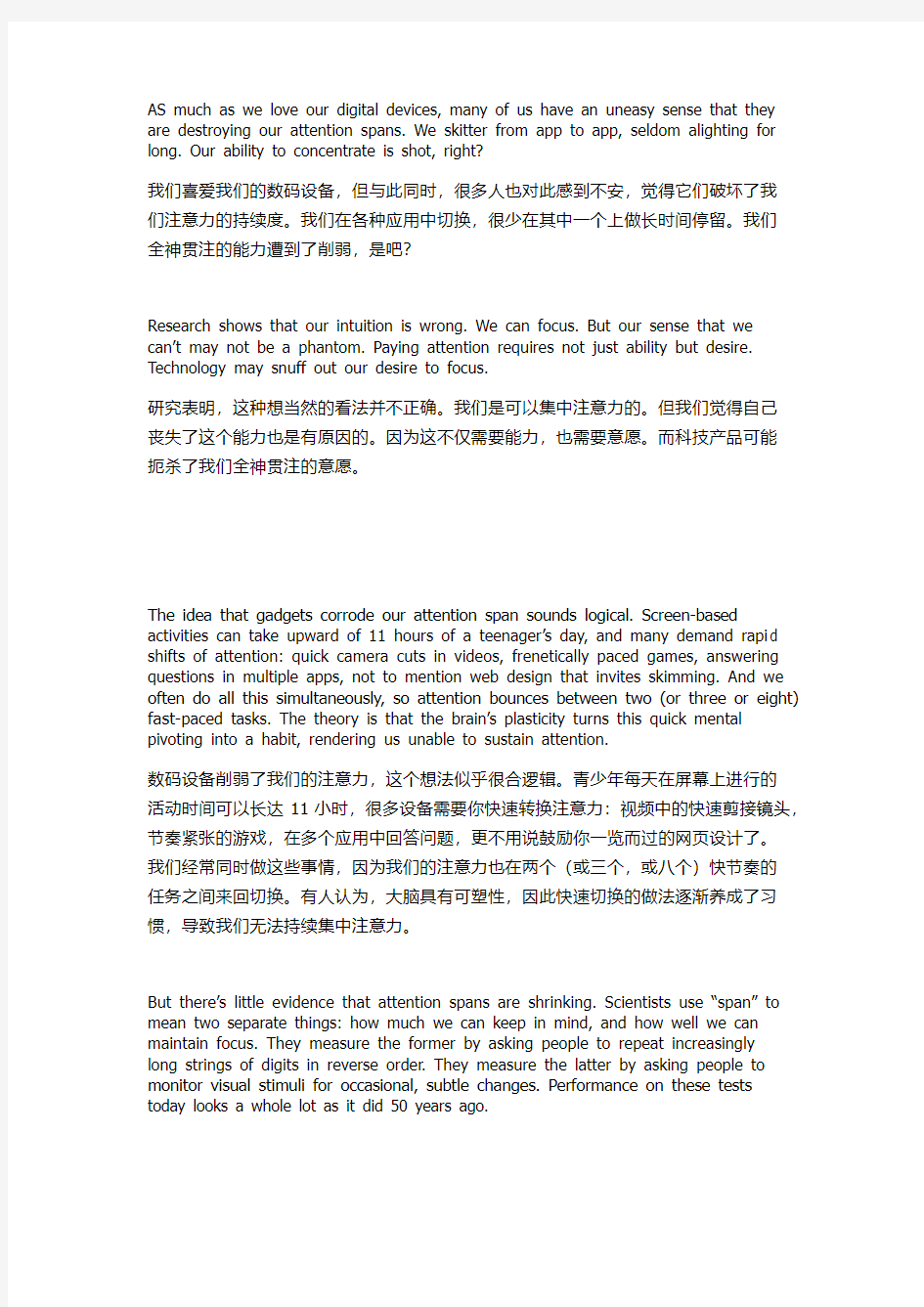双语阅读:智能手机没让我们变傻

- 1、下载文档前请自行甄别文档内容的完整性,平台不提供额外的编辑、内容补充、找答案等附加服务。
- 2、"仅部分预览"的文档,不可在线预览部分如存在完整性等问题,可反馈申请退款(可完整预览的文档不适用该条件!)。
- 3、如文档侵犯您的权益,请联系客服反馈,我们会尽快为您处理(人工客服工作时间:9:00-18:30)。
AS much as we love our digital devices, many of us have an uneasy sense that they are destroying our attention spans. We skitter from app to app, seldom alighting for long. Our ability to concentrate is shot, right?
我们喜爱我们的数码设备,但与此同时,很多人也对此感到不安,觉得它们破坏了我
们注意力的持续度。我们在各种应用中切换,很少在其中一个上做长时间停留。我们
全神贯注的能力遭到了削弱,是吧?
Research shows that our intuition is wrong. We can focus. But our sense that we can’t may not be a phantom. Paying attention requires not just ability but desire. Technology may snuff out our desire to focus.
研究表明,这种想当然的看法并不正确。我们是可以集中注意力的。但我们觉得自己
丧失了这个能力也是有原因的。因为这不仅需要能力,也需要意愿。而科技产品可能
扼杀了我们全神贯注的意愿。
The idea that gadgets corrode our attention span sounds logical. Screen-based activities can take upward of 11 hours of a teenager’s day, and many demand rapi d shifts of attention: quick camera cuts in videos, frenetically paced games, answering questions in multiple apps, not to mention web design that invites skimming. And we often do all this simultaneously, so attention bounces between two (or three or eight) fast-paced tasks. The theory is that the brain’s plasticity turns this quick mental pivoting into a habit, rendering us unable to sustain attention.
数码设备削弱了我们的注意力,这个想法似乎很合逻辑。青少年每天在屏幕上进行的
活动时间可以长达11小时,很多设备需要你快速转换注意力:视频中的快速剪接镜头,节奏紧张的游戏,在多个应用中回答问题,更不用说鼓励你一览而过的网页设计了。
我们经常同时做这些事情,因为我们的注意力也在两个(或三个,或八个)快节奏的
任务之间来回切换。有人认为,大脑具有可塑性,因此快速切换的做法逐渐养成了习惯,导致我们无法持续集中注意力。
But there’s little evidence that attention spans are shrinking. Scientists use “span” to mean two separate things: how much we can keep in mind, and how well we can maintain focus. They measure the former by asking people to repeat increasingly long strings of digits in reverse order. They measure the latter by asking people to monitor visual stimuli for occasional, subtle changes. Performance on these tests today looks a whole lot as it did 50 years ago.
但几乎没有证据表明,人们注意力的持续度正在缩短。科学家用“持续度”来表示两
种不同的东西:我们一次可以记住多少东西,以及我们可以全神贯注的程度。他们测
量前者的方式是让人以相反的顺序复述越来越长的数字串。衡量后者时则要求人监测
视觉刺激,注意到偶然发生的微妙变化。这些测试的结果似乎和50年前相差无几。
Scientists also note that although mental tasks can change our brains, the impact is usually modest. For example, practice with action video games improves some aspects of vision, but it’s a small boost, not an overhaul of how we see. Attention is so central to our ability to think that a significant deterioration would require a retrofitting of other cognitive functions. Mental reorganization at that scale happens over evolutionary time, not because you got a smartphone.
科学家还指出,虽然心智任务可以改变我们的大脑,但其影响通常不大。例如,对于
我们如何看东西,动作类电子游戏改善了其中的某些方面,但幅度很小,并不显著。
注意力是我们思考能力的核心,以至于只有加上其他认知功能的变化才会导致它出现
显著恶化。这种程度的心智重组属于进化范畴,不是弄到一部智能手机就会发生的。
But if our attention span is not shrinking, why do we feel it is? Why, in a 2012 Pew survey, did nearly 90 percent of teachers claim that students can’t pay attention the way they could a few years ago? It may be that digital devices have not left us unable to pay attention, but have made us unwilling to do so.
但是,如果我们的注意力持续度没有缩减,为什么我们会有这种感觉呢?为什么皮尤(Pew)2012年的一项调查显示,将近90%的教师说学生们不像几年前那样注意力集中了?这可能是因为数码设备虽然没有让我们削弱集中注意力的能力,但却让我们失去
了这样做的意愿。
The digital world carries the promise of amusement that is constant, immediate and limitless. If a YouTube video isn’t funny in the first 10 seconds, why watch when I can instantly seek something better on BuzzFeed or Spotify? The Internet hasn’t shortened my attention span, but it has fixed a persistent thought in the back of my mind: Isn’t there’s something better to do than what I’m doing?
数码世界提供了源源不断、即时、无限的娱乐活动。如果YouTube上一段视频的前10秒没意思,那为何还要看它,反正我可以马上到BuzzFeed或Spotify找到更好的东西?互联网没有缩减我的注意力持续度,但它改变了我脑海中一个长期以来的想法:是不
是有什么东西比我现在手上的更好?
Are we more easily bored than we were 20 years ago? Researchers don’t know, but recent studies support the suggestion that our antennas are always up. People’s
